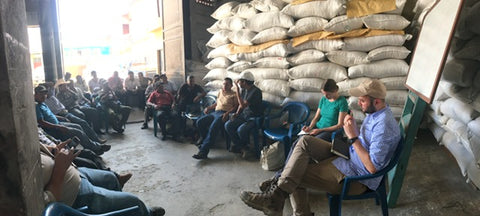We drove out of the small mountain town before daylight. There were no street lights in Chajul, Guatemala and as we worked our way up switch backs over the pass the only evidence from the town below was the slow rising columns of smoke from morning stoves. The community is around 2,000 residents primarily of indigenous descent, mainly subsistence farmers, coffee and honey farmers. The coffee cooperative we came to visit is CHAJUL. This co-op is 1,500 members strong and reaches far beyond this small town to the surrounding jungles and mountains into the most remote parts of northwest Guatemala. This region was victim to a war that ravaged the land in scorched earth destruction and a genocide that left half the population slaughtered during the second half of the 20th century. These horrific crimes were carried out by US backed government units and gorilla counter forces and perpetrated under the guise of regional Cold War politics. In result, they tragically devastated the indigenous populations that were caught in the middle. We drove 4 hours to some of the more remote regions and farms in the cooperative to meet these survivors, farmers, and innovators as they begin this years harvest under the new threat of Roya.
(CHAJUL farmer Balthazar in his hill side coffee plot, surrounded by organic biodiversity assessing the first harvest of the new year)
"Roya" has ravaged Latin American coffees over the last 5 years. A fungus that normally affects only low altitude coffee plants, Roya is spreading up the mountains because of the effects of a warming climate. In the last 5 years the production of coffee has been cut from 44 containers (at its peek) to a staggering 11 containers in 2014. The reciprocal effects on farmers, families and communities has been devastating. Desperation parallels the Chajul cooperative to reach out to other cooperatives that had also been effected by the fungus in Honduras and Peru. Through an exchange on information and a new organic tool the cooperative hopes to exceed their estimate for 15 containers this year.

(Roya effects on the leaves and on the entire plant after leaves have fallen)
The new tool in preventing and protecting the coffee plants against this leaf curl is Effective Microorganism or EMs. These can be thought of a probiotic for the soil and plant. Combined with molasses (fuel), water (transferred) and experimental amounts of minerals (magnesium, phosphorus, iron and zinc) these EMs are being applied to the soil and plants multiple times during the growth cycle to bust its ability to resist Roya. Batches of EMs are being mixed at central location, fermented for 40 days and then distributed and diluted to remote farmers.

(CHAJUL technicians Matthieu & Fransisco working with EMs to prevent Roya)

(Living EMs and the EM steeped tea used to treat coffee plants against Roya)
The success rate has been impressive and organizations such as The Coffee Trust and groups funded by Cooperative Coffee Fair Trade premium are working to spread educations and access to EMs for all farmers effected.
(meeting with the farmers of Manos Campesinas to discuss the new harvest and the effects of Roya)
The excitement around effects and potentials for EMs was inspiring. From a land and people that have faced so many changes and threats to their livelihood, it's amazing that they remain persistent to grow high quality organic coffee. The feeling of connection to the bigger world of coffee bonding our roastery and community of consumers to these farmers in remote jungle mountains of Guatemala was profoundly gratifying and humbling. As we left the shaded mountains of coffee and drove back over the rutted and washed out roads I was consumed by the immense gratuity to be part of interconnected world of coffee.
(healthy Roya resistant crop after a successful EM treatment)







Love the coffee… Sadly I can’t drink as much as I used to… This looks like a terrific trip. (I buy my coffee from Meridian in Fairfield – so happy to have a place to buy it.) Keep up the great work, and the blog! Nice idea. Loved reading about it.
Wow! I am impressed! THanks you for educating me on Roya. What a great trip.
Leave a comment